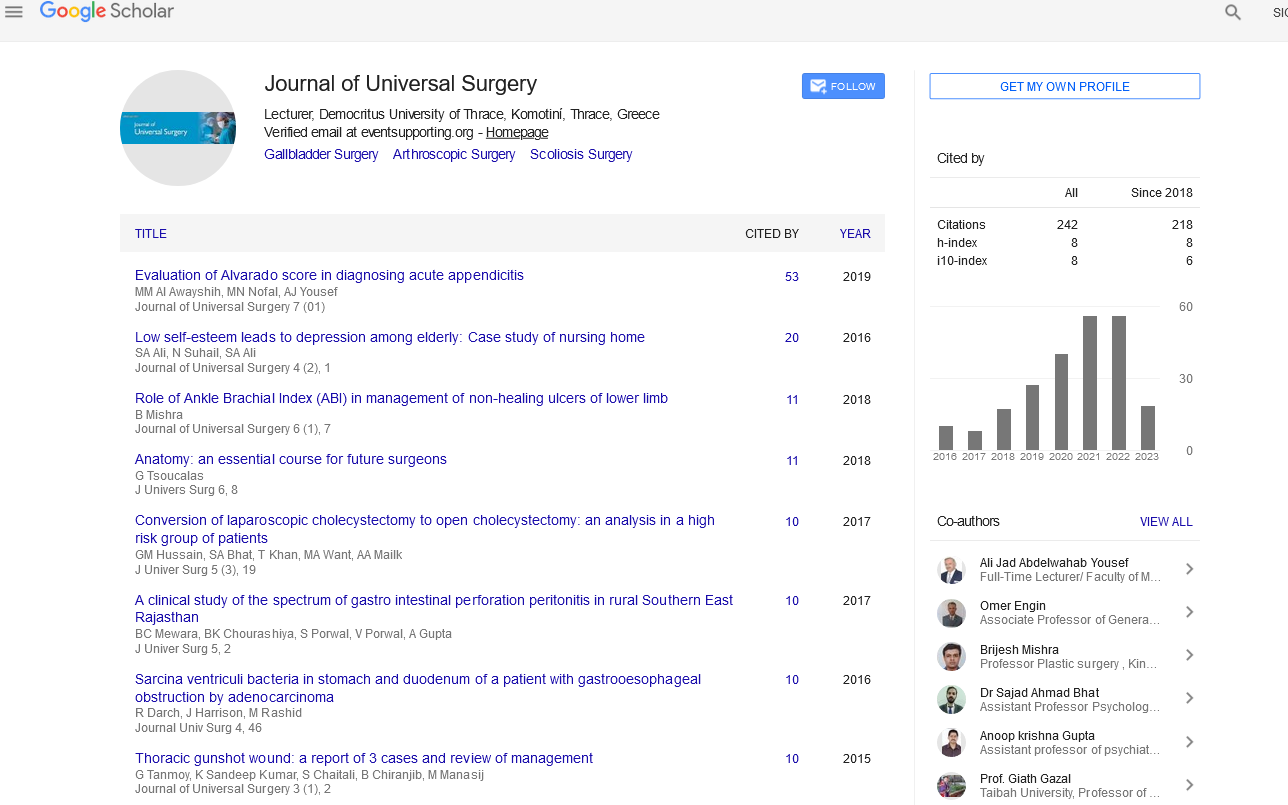Perspective - (2024) Volume 12, Issue 5
Body Changes After Thyroid Surgery: What to Expect
Nicolas Winding Refn*
Department of Endocrinology, University of Griesen, Griesen, Germany
*Correspondence:
Nicolas Winding Refn, Department of Endocrinology, University of Griesen, Griesen,
Germany,
Email:
Received: 25-Sep-2024, Manuscript No. IPJUS-24-15229;
Editor assigned: 30-Sep-2024, Pre QC No. IPJUS-24-15229 (PQ);
Reviewed: 14-Oct-2024, QC No. IPJUS-24-15229;
Revised: 21-Oct-2024, Manuscript No. IPJUS-24-15229 (R);
Published:
29-Oct-2024
Introduction
Thyroid surgery, also known as a thyroidectomy, is a common
procedure for treating various thyroid conditions, such as thyroid
cancer, goiter or hyperthyroidism. While the surgery often
provides relief from these conditions, it also triggers several
changes in the body that can vary depending on the type of
surgery performed, the amount of thyroid tissue removed and
individual factors. Understanding these changes is crucial for
post-surgery recovery and overall health management.
Description
Overview of thyroid function
The thyroid gland is a butterfly-shaped organ located at the
base of the neck that plays a crucial role in regulating the body’s
metabolism. It secretes hormones-thyroxine (T4) and
triiodothyronine (T3)-that control energy production, heart rate,
body temperature and weight, among other functions. When
part or all of the thyroid is removed, it can disrupt the balance of
these hormones, leading to noticeable changes in the body.
Types of thyroidectomy and their impact
The changes a patient experiences post-thyroid surgery
largely depend on the extent of the thyroidectomys.
Partial thyroidectomy: In this procedure, only a portion of the
thyroid is removed. The remaining part often continues to
function normally and many patients do not require hormone
replacement therapy.
Total thyroidectomy: This involves removing the entire
thyroid gland. In this case, patients will need lifelong hormone
replacement therapy, as the body will no longer produce thyroid
hormones.
Subtotal Thyroidectomy: A significant portion of the gland is
removed, but some tissue is left behind. Like a partial
thyroidectomy, the remaining tissue may continue to function,
though hormone levels may fluctuate.
Common body changes after thyroid surgery
Hormonal imbalance and hypothyroidism: The most
significant change following thyroid surgery is related to thyroid
hormone levels. Without enough thyroid tissue, the body may
not produce sufficient hormones, leading to hypothyroidism.
Symptoms of hypothyroidism include.
Fatigue: A significant decrease in energy levels is common, as
metabolism slows down.
Weight gain: Sluggish metabolism often results in weight gain,
despite no changes in diet or exercise.
Cold sensitivity: The body struggles to regulate temperature,
leading to an increased sensitivity to cold.
Dry skin and hair: The lack of hormones can cause skin to
become dry and hair to become brittle or thin.
Constipation: A slower metabolism affects the digestive
system, often leading to constipation.
Depression or mood swings: Thyroid hormones also influence
mental health and many patients experience changes in mood,
including feelings of depression or anxiety.
Voice changes
Thyroid surgery involves operating near the vocal cords, so
temporary or permanent voice changes are possible. These
changes can range from hoarseness to a weak voice, difficulty
projecting or even loss of voice. For most patients, these issues
are temporary, lasting a few weeks to months, but for some,
they can be long-term, especially if the recurrent laryngeal
nerve, which controls vocal cord movement, is affected.
Calcium imbalance and hypoparathyroidism
During thyroid surgery, the parathyroid glands, which regulate
calcium levels, may be accidentally damaged or removed. This
condition, known as hypoparathyroidism, leads to hypocalcemia
(low calcium levels), resulting in symptoms such as:
Tingling or numbness: Commonly felt in the hands, feet and
around the lips.
Muscle cramps or spasms: Low calcium can lead to
involuntary muscle contractions.
Weakness and fatigue: Due to the decreased availability of
calcium, which is critical for muscle and nerve function.
Severe cases: In rare instances, severe hypocalcemia can lead
to more serious complications like seizures.
Metabolism and weight fluctuations
Thyroid hormones regulate the body’s metabolism, so their
absence or imbalance can lead to fluctuations in weight. Many
patients experience weight gain, especially if hypothyroidism
develops. On the other hand, patients who were previously
hyperthyroid (overactive thyroid) and had rapid metabolism may
find that their weight stabilizes or decreases as hormone levels
normalize.
Managing weight after thyroid surgery can be challenging, as
traditional methods like diet and exercise may be less effective
without the proper hormone balance. For some patients,
adjusting their dose of thyroid hormone replacement
medication can help improve metabolism and weight
management.
Changes in heart rate and blood pressure
Thyroid hormones play a key role in regulating heart rate and
blood pressure. After surgery, if hormone levels drop, patients
may experience a slower heart rate, low blood pressure, or
feelings of dizziness and faintness. Conversely, if thyroid
hormone levels are too high due to over-replacement, patients
may experience an increased heart rate, palpitations or high
blood pressure.
Careful monitoring of thyroid hormone levels and adjusting
medication as needed can help manage these cardiovascular
changes.
Conclusion
Thyroid surgery, while often necessary for treating thyroid
conditions, leads to various body changes that require careful
management. Hormonal imbalances, voice changes, calcium
fluctuations and emotional effects are common post-surgery
experiences. However, with proper medical follow-up, hormone
replacement therapy and support, most patients adjust well to
the changes and go on to lead healthy, fulfilling lives.
Citation: Refn NW (2024) Body Changes after Thyroid Surgery: What to Expect. J Univ Surg Vol.12 No.5: 046.





